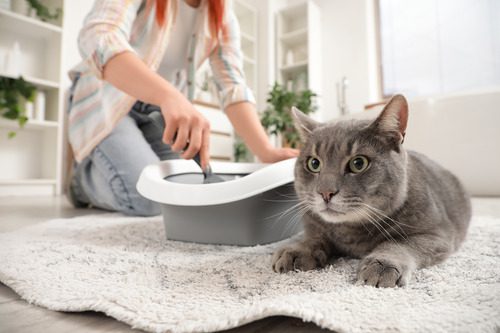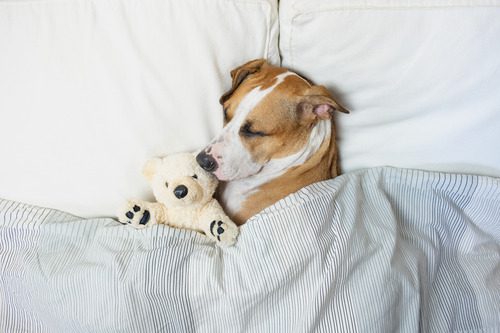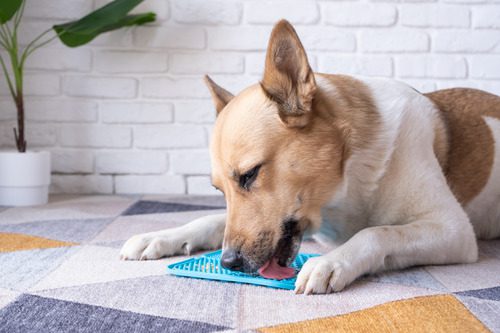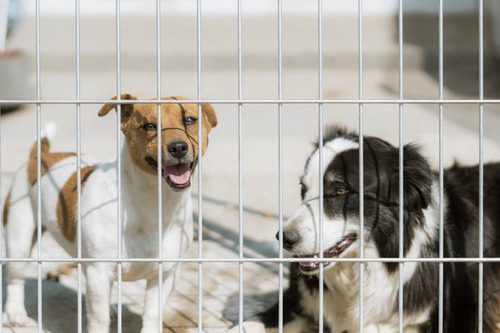Why is My Cat Pooping Outside the Litter Box?
Finding poop outside the litter box is frustrating and it’s even more confusing when your cat has been using their box reliably for years. While it might feel like your cat is misbehaving, there’s usually a reason behind the behavior. From medical conditions to environmental stressors, several factors can lead to inappropriate elimination. This blog will help you understand why your cat is pooping outside the litter box so you can help resolve the issue and restore peace to your home. If your cat has started leaving messes around the house, help is available.

Common Reasons Cats Poop Outside the Litter Box
When a cat begins pooping outside the litter box, it can be easy to assume it’s a behavior issue. However, cats are creatures of habit and tend to stick to their routine unless something is bothering them. It’s important to approach the situation thoughtfully and consider all possibilities.
Medical Causes
Health issues can be a primary reason for a cat pooping outside the litter box. Gastrointestinal discomfort, constipation, diarrhea, arthritis, or other underlying problems may cause your cat to associate the litter box with pain or difficulty. Older cats, in particular, may struggle to get into or out of their litter box due to joint stiffness or mobility challenges. Cats with inflammatory bowel disease (IBD) or chronic digestive issues might not make it to the box in time. If your cat’s stool appears abnormal, schedule an exam as soon as possible. A physical exam and diagnostic tests can help your veterinarian identify or rule out health-related causes.
Behavioral Issues
If your cat has a clean bill of health, behavioral issues might be contributing to the problem. Changes in the household like a new pet, a new baby, or a recent move can trigger stress that affects your cat’s bathroom habits. Some cats become territorial and may avoid the litter box if another pet uses it or if they feel their space is threatened. Cats may also begin pooping outside the box if they experience a one-time scare while using it. Loud noises, other pets, or even startling smells can create negative associations with the litter box. Your cat may then look for alternative places that feel safer or more private.
Is the Litter Box the Problem?
Litter box conditions have a major impact on whether a cat chooses to use it consistently. Cats can be very particular about cleanliness, placement, and even the type of litter used.
Cleanliness and Odor
Cats rely heavily on scent to navigate their environment. A dirty litter box or strong chemical odor can make the box unappealing. If your cat doesn’t feel comfortable using it, they’ll look for a cleaner place to go. Ideally, litter boxes should be scooped daily and fully cleaned with mild soap and water once a week. If you’re using a heavily fragranced litter or a box liner that crinkles loudly, your cat might not like the way it smells or feels. Stick to unscented, clumping litter that closely mimics natural sand textures.
Number and Placement of Litter Boxes
In multi-cat households, one litter box may not be enough. A good rule of thumb is one box per cat, plus one extra. If your cat feels overcrowded or senses competition over a single box, they might stop using it altogether. Placement matters, too. Litter boxes should be in low-traffic, quiet areas where your cat feels secure. Avoid placing them near loud appliances, food bowls, or in places where your cat can be ambushed by other pets.
Environmental Stress Can Trigger Changes in Bathroom Behavior
Cats are sensitive to changes in their environment and routine. Even small disruptions can cause stress, which may show up as behavioral changes including pooping outside the litter box.
Changes at Home
Have you recently rearranged furniture, brought home a new pet, or started spending more or less time at home? Even minor changes can throw your cat off. They may express their anxiety by eliminating in unusual places, particularly in spots that smell strongly of their human family (like laundry or bedding).
Introducing New Pets
Bringing another cat or dog into the home can lead to temporary elimination problems. Territorial marking and stress-related accidents are common during introductions. If the new animal is perceived as a threat, your resident cat may avoid the litter box entirely. It may take time and careful reintroduction for your cat to adjust. Providing multiple litter boxes in separate areas can help minimize tension. Giving each cat their own space including separate feeding stations and hiding spots can also reduce anxiety and restore confidence.
How to Respond When Your Cat Starts Pooping Outside the Litter Box
A calm, patient response will go a long way when addressing this issue. Punishment does not work and can increase anxiety, which makes the problem worse. Instead, focus on identifying the cause and working with your veterinarian to create a plan.
Track the Behavior
Keep a log of when and where the accidents happen, along with any changes you’ve noticed in your cat’s health, diet, or environment. Take note of the stool’s appearance and whether your cat still urinates in the box. These details will help your vet determine what’s happening.
Clean Accidents Thoroughly
Use an enzymatic cleaner to eliminate odor from any soiled areas. Standard cleaners may mask the smell for humans, but your cat’s nose is much more sensitive. If the scent remains, your cat may return to the same spot to poop again.
Avoid Drastic Changes
Stick to your usual routine as much as possible and avoid introducing new stressors while trying to resolve the issue. If your cat needs a new litter type or box, introduce it gradually while keeping their old setup nearby. Sudden changes can add confusion and make matters worse.
Some Cats Are More Prone Than Others
Certain cats may be more likely to struggle with litter box issues, particularly if they have a history of trauma or are part of a multi-cat household. Understanding your cat’s personality and background can help you spot potential stressors before they become problems.
Kittens and Senior Cats
Kittens learning how to use the litter box need patience and consistency. If they’ve recently been adopted or came from a stressful environment, accidents are to be expected. Frequent positive reinforcement and accessible box placement can help reinforce good habits. Senior cats may develop mobility issues or cognitive decline, making it difficult to use the box regularly. They may need a box with lower sides, softer litter, or more accessible placement near their favorite resting areas.
Rescue and Shelter Cats
Cats with unknown histories or those adopted from shelters may have experienced poor litter box conditions in the past. They may not associate a litter box with comfort or cleanliness. In these cases, rebuilding trust and consistency can take time, but it’s possible with patience and support.
When Should You Schedule a Veterinary Visit?
If your cat is pooping outside the litter box consistently or suddenly changes their bathroom habits, contact your veterinarian. Medical conditions are often to blame, and even if the cause is behavioral, your vet can help guide the next steps. Best Friends Veterinary Hospital is here to help you get answers. Our team offers experienced insight into both medical and behavioral concerns related to litter box avoidance. We’ll work with you to uncover the cause and support your cat’s return to regular habits. Call one of our locations or book an appointment online today.
Recent Posts
About Best Friends Veterinary Hospital
Our veterinarians and staff warmly welcome dogs, cats, and a variety of exotic pets as patients here at our animal hospital, and we offer a host of services to give your unique family member a lifetime of excellent care.




